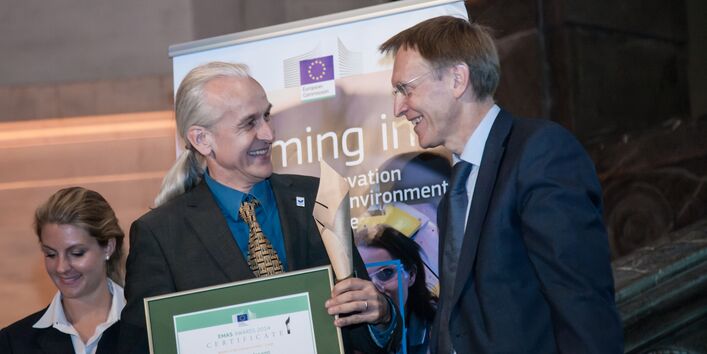UBA for more incentives for environmental management in companies
The President of the Federal Environment Agency (UBA), Maria Krautzberger, is taking a stand for stepped up commitment to environmental performance in companies and public authorities. On the occasion of the publication of the new EMAS environmental statement in which the UBA describes the environmental management system of its 15 sites, Maria Krautzberger explains: "In the long term, every organisation whose activities impact the environment must introduce a transparent and verifiable environmental management system". However, there must be more incentives to do so. "EMAS-certified enterprises that reduce their environmental impact in a systematic, transparent and verifiable way should be relieved from certain enforcement duties and reporting obligations and have easier access to funding", said the President of UBA. Furthermore, public procurement should take greater advantage of the legal scope to grant preference to EMAS-certified companies.
UBA operates a high-standard system of environmental management based on the European EMAS Regulation at all its sites in order to lastingly reduce the environmental impact of its activities. It has been standard UBA practice for years to consume green electricity, to procure environmentally friendly and efficiently produced products, to generate its own renewable energy, and to design official trips and commuter journeys in an as environmentally compatible way as possible. Maria Krautzberger said: "EMAS helps us to stay focussed on our own recommendations as concerns environmental protection. Not only does this strengthen our credibility, we also gain practical experience in that area."
The Federal Environment Agency continues to set its own ambitious goals: all future UBA events are to become climate neutral. Total energy consumption will be brought down by another three percent by 2017, from its current 13,400, to just under 13,000-megawatt level. UBA wants to increase the amount of the renewable energy it generates and uses by two thirds in the same period, that is from 270 to 500 megawatts. In the area of mobility, the Agency seeks to maintain the large share of its environmentally friendly trips to work (almost 70 percent of staff use public transport, cycle or walk to work) and to reduce the CO2 emissions of its automobile fleet from 73 tonnes per year now to 70 tonnes by 2017.
There are about 1,200 organisations at 1,900 locations in Germany which have EMAS environmental management; the figure for Europe is roughly 3,400 organisations at 10,500 sites. UBA's President Krautzberger believes the number of EMAS-certified organisations could rise significantly in the next few years if businesses took more advantage of existing incentives and new incentives are created. She named consideration of environmental statements in the context of emissions reporting, longer inspection intervals or lower administrative fees as possibilities. Another possibility which Ms Krautzberger believes is feasible is a linkage of government-granted benefits to the introduction of an environment or energy management system modelled after the exceptions regulated by the Renewable Energies Act or granting more favourable loan and insurance conditions for EMAS-certified companies. "If a business can prove with EMAS that it causes less pollution to its neighbourhood and the environment, it should also enjoy an economic benefit", said the head of UBA. For the environmental administration to reap benefit from EMAS, EMAS should be more geared towards the enforcement of environmental legislation. The planned amendment of the European EMAS in 2016 would provide the opportunity to make EMAS more attractive. "We will be submitting our proposals to the EU Commission on this issue", Ms Krautzberger announced.
EMAS – Eco-Management and Audit Scheme – prescribes actual responsibilities and processes in corporate environmental management and compliance with environmental requirements. A certified verifier conducts an annual review for compliance with all its provisions. EMAS also requires the use of verifiable indicators to document the development of relevant environmental aspects in an environmental statement.
